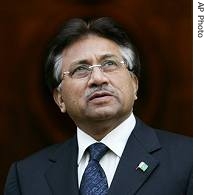-
(单词翻译:双击或拖选)
By Stephanie Ho
Washington
01 October 2006
 President Pervez Musharraf |
||
------
About one month ago, Pakistan and pro-Taleban militants2 in tribal3 areas bordering Afghanistan reached a much-criticized peace agreement. Under the deal, Pakistani troops would leave the North Waziristan area, while tribal chiefs would be responsible for curbing4 terrorist attacks.
On Sunday, President Musharraf said his country has not withdrawn5 the military from the tribal border regions.
"Not one soldier has been moved out. There is not one battalion6, one soldier that has been relocated. What is anyone talking of? The military is there," he said.
At the same time, he told the NBC television program Meet the Press, the deal his government struck includes one point that he says is not negotiable.
"No al Qaida activity, no Taleban activity, on our side or across the border," said Mr. Musherref. "And we signed this, and they agreed to this. Now, what is the problem?"
The Afghan government has repeatedly said the Taleban has used the Pakistani border area as a base for attacks.
On Sunday, Mr. Musharraf urged Afghanistan to stop criticizing Pakistan and come up with what he called a "counter strategy" to deal with the problem.
President Bush hosted Mr. Musharraf and Afghan President Hamid Karzai at the White House last week, for a three-way meeting.
During his time in the United States, the Pakistani leader also has been busy promoting his new book, a memoir7 called In the Line of Fire.
One of the revelations in it is his belief that the war in Iraq has made the world a more dangerous place. He was asked if he raised these concerns with President Bush, who maintains that U.S. actions there have made the world a safer place.
"When we discuss, we have not discussed it in such detail," he said. "And I look more - instead of talking about what it has become, we are talking about what is the present and what is the solution to the problem."
Although he never favored the invasion of Iraq, he glossed8 over this disagreement by saying "whatever has happened has happened." The Pakistani President urged the United States not to pull out of Iraq until the country has been stabilized9, and added that a precipitous withdrawal10 could have a chaotic11 effect on the region.
 收听单词发音
收听单词发音
1
sanctuary

|
|
| n.圣所,圣堂,寺庙;禁猎区,保护区 | |
参考例句: |
|
|
|
2
militants

|
|
| 激进分子,好斗分子( militant的名词复数 ) | |
参考例句: |
|
|
|
3
tribal

|
|
| adj.部族的,种族的 | |
参考例句: |
|
|
|
4
curbing

|
|
| n.边石,边石的材料v.限制,克制,抑制( curb的现在分词 ) | |
参考例句: |
|
|
|
5
withdrawn

|
|
| vt.收回;使退出;vi.撤退,退出 | |
参考例句: |
|
|
|
6
battalion

|
|
| n.营;部队;大队(的人) | |
参考例句: |
|
|
|
7
memoir

|
|
| n.[pl.]回忆录,自传;记事录 | |
参考例句: |
|
|
|
8
glossed

|
|
| v.注解( gloss的过去式和过去分词 );掩饰(错误);粉饰;把…搪塞过去 | |
参考例句: |
|
|
|
9
stabilized

|
|
| v.(使)稳定, (使)稳固( stabilize的过去式和过去分词 ) | |
参考例句: |
|
|
|
10
withdrawal

|
|
| n.取回,提款;撤退,撤军;收回,撤销 | |
参考例句: |
|
|
|
11
chaotic

|
|
| adj.混沌的,一片混乱的,一团糟的 | |
参考例句: |
|
|
|















